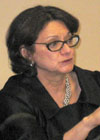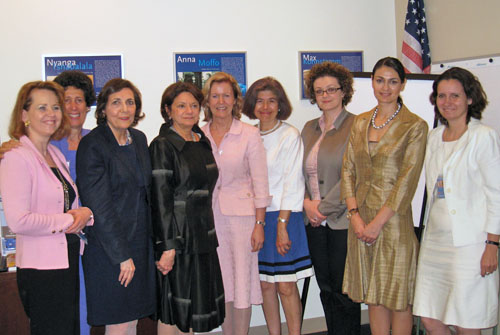Addressing World Crises at the UN: The Role of the US
Ambassador Rosemary DiCarlo, US Deputy Permanent Representative to the UN
Co-sponsored with the Institute of International Education
Photos | Transcript
 New York, NY—On June 16, 2011, Ambassador Rosemary DiCarlo, US Deputy Permanent Representative to the United Nations, briefed WFPG members, diplomats, and guests on the role of the US in addressing crises at the UN. In her remarks, DiCarlo emphasized the importance of US leadership and active engagement at the UN and explained how the UN could help the US achieve policy objectives such as combating nuclear proliferation, preventing and mediating conflicts, encouraging development, and protecting human rights. The program was co-sponsored by the Institute of International Education.
New York, NY—On June 16, 2011, Ambassador Rosemary DiCarlo, US Deputy Permanent Representative to the United Nations, briefed WFPG members, diplomats, and guests on the role of the US in addressing crises at the UN. In her remarks, DiCarlo emphasized the importance of US leadership and active engagement at the UN and explained how the UN could help the US achieve policy objectives such as combating nuclear proliferation, preventing and mediating conflicts, encouraging development, and protecting human rights. The program was co-sponsored by the Institute of International Education.
DiCarlo spoke about the US' leading role in combating proliferation of weapons of mass destruction. In 2009, President Obama chaired a UN Security Council session, the first time that an American president had done so, and this led to a unanimous resolution seeking a worldwide end to nuclear proliferation within four years. Since then, the US has led the effort to impose tough sanctions on North Korea and Iran because of their nuclear activity. The US also strongly supports the 1540 Committee, which assists states in combating proliferation by non-state actors.
DiCarlo also talked about the role of the UN in preventing conflict and promoting peace. The US does not have the ability to intervene in every world conflict, and so it is a strong supporter of UN peacekeeping missions. Utilizing UN peacekeepers allows the US to share the burden of a mission with other states and costs much less than a US military intervention. DiCarlo pointed to the January referendum for South Sudans independence as a UN success story. The US also promotes peace through its large contributions to the UN humanitarian and development agencies. Since the UN is politically neutral, these agencies can often intervene in places where the US may not be welcome.
DiCarlo then spoke about US membership to the Human Rights Council. Though the US recognizes the imperfect nature of the HRC, it is a member because "it gives us the best chance to be a constructive influence." This year, the US has had several achievements. Syria and Iran withdrew their candidacies for HRC membership, and Libya has been recommended for suspension. The US also lobbied successfully for the protection of LGBT rights at the UN and for the conferring of consultative status to the International Gay and Lesbian Human Rights Commission. In addition, the US was a strong supporter of the creation of the new agency UN Women, whose Executive Director, Michelle Bachelet, addressed WFPG in April.
DiCarlo ended her speech with a discussion of the recent political upheavals in the Middle East. She outlined the three main principles that are guiding the US response to these crises. First, the US opposes violence against unarmed protestors. Second, the US urges the protection of universal human rights and freedoms. Third, the US will continue to support peoples desire for government reform. In Libya, the US has helped lead an internationally-sanctioned action to protect civilians. The US now recognizes the Transitional National Council as the legitimate voice of the Libyan people, and is urging other states to do the same. In regards to Syria, the US is deeply concerned about the Assad regimes use of military force against civilians. It is also concerned with Irans involvement in the conflict. The US feels that the UN Security Council needs to put greater pressure on the Assad regime to stop the violence and grant humanitarian access immediately.

Ambassador Rosemary DiCarlo, WFPG President Patricia Ellis, and Peggy Blumenthal of IIE
with women ambassadors to the UN from Iceland, Ireland, and the Czech Republic,
the Ambassador of Uruguay to the OAS, and the Consuls General of Cyprus and Kosovo